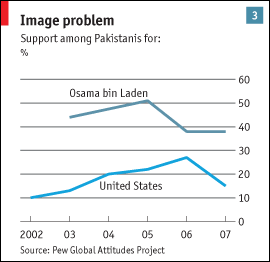
ISIS and Al-Qaeda differ significantly in their strategy to lead the jihadist movement, a primary reason for their seperation. ISIS has a simple focus which is to establish a state immediately. That was their first and foremost objective and resulted in ISIS' focus on local regimes in contrast to Al-Qaeda's preference to deal with the far away problems first. ISIS' focus on territory contributed to their attacks and murders being primarily against Muslims in the areas they are siezing who would not conform to their ideology. According to a United Nations report surveying the deaths that ISIS was responsible for during the first eight months of 2014, 9,347 Muslim civilians were killed and over 17,000 were wounded.[UN Report pdf] Media coverage in America tends to emphasize attacks targeting Americans or other Westerners, which are often filmed and put online. The media focus has contributed to Americans thinking that the ISIS threat is focused much closer to home. However, ISIS focuses on local regimes, and Al-Qaeda is the group that sees the establishment of a territory as a long term objective.
Local regimes may be preventing Al-Qaeda from growing, but the group has chosen to focus on what they see as the bigger problem: Western nations who prop up these oppresive regimes. In particular, Osama bin Laden and current leader Al-Zawahiri insisted the group must drive the United States out of the Middle East before they could see any success in establishing a caliphate as stated in both letters written by the men. Since the U.S. was set on maintaining involvement in places such as Egypt, Saudi Arabia and Israel, Al-Qaeda resorted to violence to get their point accross, as outlined in depth by al-Zawahiri's letter. Until Al-Qaeda elicits some kind of response from the United States, they will continue to attempt to conduct terror attacks on Americans and those aiding us, and as they get stronger in their multiple safe havens, they will have more manpower and resources to conduct these attacks.
While Al-Qaeda does have access to these safe havens, they have not yet established a territory, which was the first item on ISIS' checklist. Even though Al-Qaeda lacks the official territory and their networking strategy is slower paced, their capability to plan long term strategies will only strenghten their ability to govern their followers resulting in consistantly better organized attacks. Where ISIS forced many to choose between adopting their ideology or face a gruesome death, Al-Qaeda's strategy is now to fight alongside of those they form alliances with and use every chance they get to condemn ISIS' actions as acts of opposition to the Muslim religion. Al-Qaeda's strategy will also allow them to avoid the backlash ISIS faces from killing fellow Muslims. In the letters written by Al-Qaeda's leadership, they displayed multiple examples of their ability to rely on advanced organization as they planned for various outcomes of their objectives and cited past historical events within their writing.
STRATEGY
"As for the secretarian and chauvanistic factor, it is secondary in importance to outside aggression, and is much weaker than it..."
-Al-Zawahiri-
Al Zawahiri clearly states Al-Qaeda's target in his 2012 letter to al-Zarqawi, former ISIS leader. It is clear that his focus is on the West as he urges his former affiliate to take after his lead, rather than continue terrorizing the Muslims in local regimees.

To see these examples now or for more information on Al-Qaeda's strategy, skip to Osama bin Laden's letter to his operant or al-Zawahiri's letter to the former A-Qaeda in Iraq affiliate by clicking the button below. Both are translated to English and portray their strategy in their own words.

Displayed in the survey from the economist on the left, the percentage of Pakistani support for Osama bin Laden is comapred with the support of the United States. It is clear that Bin Laden has gained public support as he sought to do, as he remains popular among nearly half of Pakistanis from 2002 until 2007.
The image on the right, from World Opinion Survey, may account for positive views towards Al-Qaeda who targets the U.S., and negative views towrds the United States as many believe U.S. intentions are to weaken Islam. Utilizing this common opinion, Al-Qaeda is able to gain more support to help them unify if they do establish a state.
